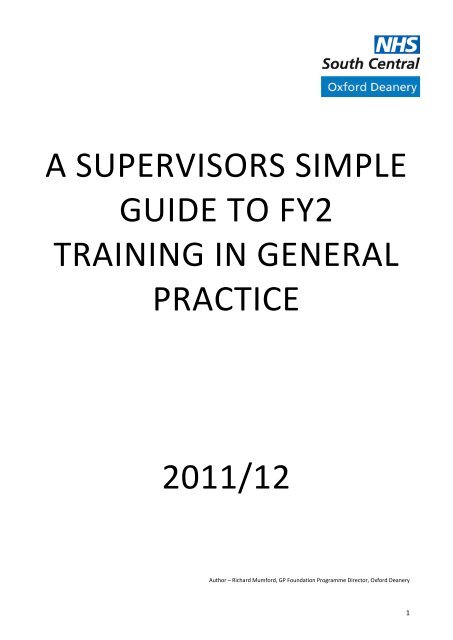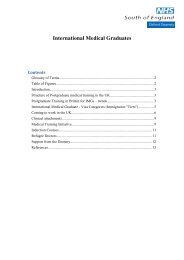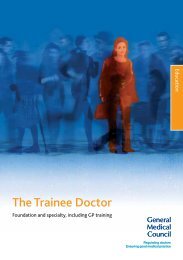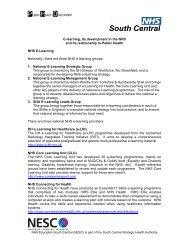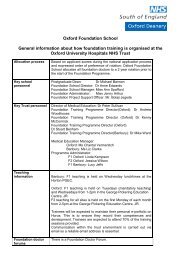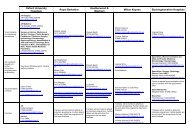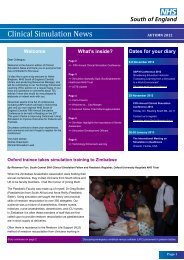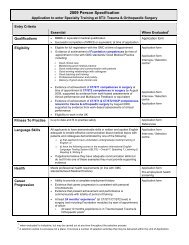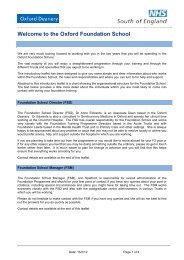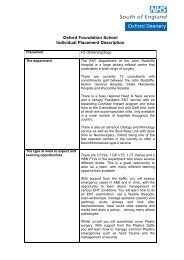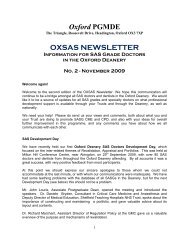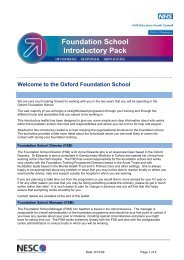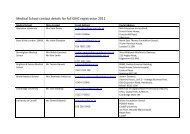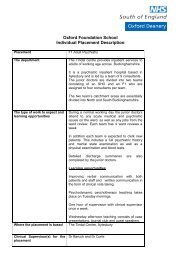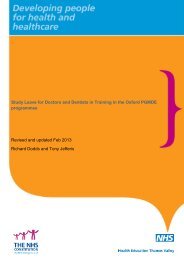Supervisors guide to FY2 training - Oxford Deanery
Supervisors guide to FY2 training - Oxford Deanery
Supervisors guide to FY2 training - Oxford Deanery
Create successful ePaper yourself
Turn your PDF publications into a flip-book with our unique Google optimized e-Paper software.
A SUPERVISORS SIMPLE<br />
GUIDE TO <strong>FY2</strong><br />
TRAINING IN GENERAL<br />
PRACTICE<br />
2011/12<br />
Author – Richard Mumford, GP Foundation Programme Direc<strong>to</strong>r, <strong>Oxford</strong> <strong>Deanery</strong><br />
1
Introduction<br />
This Simple Guide <strong>to</strong> Foundation Programme Training in General Practice is intended <strong>to</strong> be exactly<br />
that. Every practice is different and will offer different learning opportunities for their foundation<br />
doc<strong>to</strong>rs. This <strong>guide</strong> is not intended <strong>to</strong> be either definitive or prescriptive but a framework that you<br />
can build on and adapt <strong>to</strong> suit your circumstances.<br />
It is written specifically for educational and clinical supervisors of <strong>FY2</strong> doc<strong>to</strong>rs working in General<br />
Practice. It may however be of use/interest <strong>to</strong> the wider team in General Practice including the<br />
<strong>FY2</strong> doc<strong>to</strong>rs themselves.<br />
The content of the <strong>guide</strong> draws from a combination of the:<br />
• Experiences of GPs who have trained Foundation Programme Doc<strong>to</strong>rs<br />
• Experiences of <strong>FY2</strong> doc<strong>to</strong>rs who have completed the programme<br />
• Experiences of the <strong>Deanery</strong> team working on the foundation programme<br />
• National <strong>guide</strong>lines and directives<br />
Many of you are already experienced teachers of GP Registrars or Medical Students, for others this<br />
is a very new undertaking but we hope that everyone will find it helpful in one way or another.<br />
For the purpose of this <strong>guide</strong> the term ‘trainer’ refers <strong>to</strong> the person nominated by the practice<br />
(and agreed by the <strong>Deanery</strong>) <strong>to</strong> have overall educational and clinical responsibility for the<br />
Foundation Doc<strong>to</strong>r DURING THEIR TIME IN GENERAL PRACTICE<br />
Background<br />
Modernising Medical Careers<br />
In August 2002, the Chief Medical Officer, Sir Liam Donaldson, published ‘Unfinished Business’<br />
which described the two-year foundation programme. This effectively replaces the PRHO year and<br />
the first SHO year. In April 2004 the MMC Strategy Group published ‘Modernising Medical Careers<br />
– The Next Steps’. This outlined the programme structure, content and context. It emphasised the<br />
diagnosis and management of the acutely ill patient as a key aim of the programme, not simply in<br />
acute hospitals, but also in mental health and general practice settings. Each 2 Year programme is<br />
most often made up of 6 x 4-monthly rotations (commencing in August, December & April),<br />
although in the <strong>Oxford</strong> <strong>Deanery</strong> there are some 3-month and some 6-month posts. 55% of <strong>FY2</strong><br />
doc<strong>to</strong>rs have been doing General Practice placements since 2006. GP placements have proved<br />
very popular.<br />
The Collins Report (http://www.mee.nhs.uk/pdf/401339_MEE_FoundationExcellence_acc.pdf )<br />
outlines the intention <strong>to</strong> increase this percentage.<br />
The Foundation Programme is an outcome-based educational process. It has defined<br />
competencies <strong>to</strong> be achieved and a defined process of assessment with defined assessment<br />
<strong>to</strong>ols.<br />
2
Frequently Asked Questions<br />
Question<br />
What is a<br />
Foundation<br />
Programme Year<br />
2 Doc<strong>to</strong>r (<strong>FY2</strong>)?<br />
How is an <strong>FY2</strong><br />
doc<strong>to</strong>r different<br />
from a GP<br />
registrar?<br />
Who decides<br />
which doc<strong>to</strong>r will<br />
come <strong>to</strong> my<br />
practice?<br />
Does the <strong>FY2</strong><br />
doc<strong>to</strong>r have <strong>to</strong> be<br />
on the<br />
performers list?<br />
What about<br />
indemnity cover?<br />
Can an <strong>FY2</strong><br />
doc<strong>to</strong>r sign<br />
prescriptions?<br />
What about their<br />
Contract of<br />
Answer<br />
• The second year of the Foundation Programme builds on the first year<br />
of <strong>training</strong>. The programme focus is on <strong>training</strong> in the assessment and<br />
management of the acutely ill patient. Training also encompasses the<br />
generic professional skills applicable <strong>to</strong> all areas of medicine – team<br />
work, time management, communication and IT skills.<br />
• As an <strong>FY2</strong> doc<strong>to</strong>r they will have full registration.<br />
• In ‘old money’ a 1st year foundation doc<strong>to</strong>r is equivalent <strong>to</strong> a PRHO<br />
and the second year of foundation is equivalent <strong>to</strong> the old first year<br />
SHO.<br />
• The <strong>FY2</strong> doc<strong>to</strong>r is fundamentally different from a GP Registrar.<br />
• The <strong>FY2</strong> doc<strong>to</strong>r is not learning <strong>to</strong> be a GP.<br />
• You are not trying <strong>to</strong> teach an <strong>FY2</strong> doc<strong>to</strong>r the same things as a GP<br />
Registrar but in a shorter time.<br />
• The aim of this rotation is <strong>to</strong> give the <strong>FY2</strong> doc<strong>to</strong>r a meaningful<br />
experience in General Practice with exposure <strong>to</strong> the acutely ill patient<br />
in the community, which will enable them <strong>to</strong> achieve the required<br />
competencies.<br />
• The <strong>FY2</strong> doc<strong>to</strong>r requires a greater level of supervision.<br />
• Each <strong>FY2</strong> programme usually consists of three four-month rotations.<br />
There are numerous combinations and all programmes are designed <strong>to</strong><br />
ensure that trainees achieve acute competencies and generic skills.<br />
• Medical students usually rank their rotations for the entire two years<br />
of foundation and the Foundation School then allocates based on<br />
these preferences and the score obtained during national recruitment.<br />
• The <strong>Deanery</strong> approves suitable practices using an agreed set of<br />
approval criteria.<br />
• <strong>FY2</strong> doc<strong>to</strong>rs with GP in their placements are allocated <strong>to</strong> those<br />
placements by the Foundation School and the local GP <strong>training</strong><br />
programme team.<br />
• <strong>Deanery</strong> Guidance on Foundation Placements in General Practice<br />
(received in June 2006) stated that from 2nd July 2006 Foundation<br />
doc<strong>to</strong>rs are exempt from the PCO Performers List. Full details are<br />
available at:<br />
http://www.legislation.gov.uk/uksi/2006/1385/contents/made<br />
• <strong>Deanery</strong> Guidance on Foundation Placements in General Practice<br />
(received in June 2006) has stated that Trust indemnity through the<br />
employing trust will cover the GP period.<br />
• In the event of a problem with a <strong>FY2</strong> doc<strong>to</strong>r in practice the trainer has<br />
<strong>to</strong> be able <strong>to</strong> demonstrate adequate supervision had been undertaken.<br />
• Yes. An <strong>FY2</strong> doc<strong>to</strong>r is post registration and is therefore able <strong>to</strong> sign a<br />
prescription.<br />
• The Contract of Employment is held by the acute trust where the <strong>FY2</strong><br />
doc<strong>to</strong>r is based. They are responsible for paying salaries and other HR<br />
3
Question<br />
Employment?<br />
Are travel costs<br />
reimbursed?<br />
What about<br />
Study Leave?<br />
What about<br />
annual leave<br />
entitlement?<br />
What about<br />
sickness and<br />
other absence?<br />
Should an <strong>FY2</strong><br />
doc<strong>to</strong>r do out of<br />
hours shifts?<br />
Answer<br />
related issues.<br />
• However in addition <strong>to</strong> this legal contract we also require that each<br />
practice has an educational contract with each of its Foundation<br />
Doc<strong>to</strong>rs.<br />
• A specimen copy is attached at Appendix 1.<br />
• The <strong>FY2</strong> doc<strong>to</strong>r will be able <strong>to</strong> claim for travel <strong>to</strong> the practice from the<br />
base hospital.<br />
• They can also claim for any travel associated with work.<br />
• Travel claims are made through the host trust.<br />
• The <strong>FY2</strong> doc<strong>to</strong>r is eligible for up <strong>to</strong> 30 days study leave during the year.<br />
Formal FOUNDATION teaching sessions count <strong>to</strong>wards this.<br />
• Please consult the Foundation School policies on study leave for<br />
further information on how this is apportioned <strong>to</strong> foundation doc<strong>to</strong>rs.<br />
• It is essential that any applications for study leave are approved by the<br />
Foundation Programme Training Direc<strong>to</strong>r (FTPD) and the postgraduate<br />
centre.<br />
• The <strong>FY2</strong> doc<strong>to</strong>r must be released by the practice <strong>to</strong> attend their host<br />
trusts <strong>FY2</strong> teaching programme.<br />
• The <strong>FY2</strong> doc<strong>to</strong>r is entitled <strong>to</strong> 27 days per annum; where possible no<br />
more than 9/10 should be taken in each 4-month rotation and 15 in<br />
every 6-month rotation.<br />
• If an <strong>FY2</strong> doc<strong>to</strong>r wishes <strong>to</strong> take either significantly more or less than<br />
those suggested amounts in general practice please contact the FTPD<br />
at the employing trust.<br />
• A record of annual leave taken during the general practice placement<br />
should be submitted <strong>to</strong> the host Trust’s medical staffing department at<br />
the end of each month; using the pro forma attached in Appendix 6.<br />
• Any absence due <strong>to</strong> ill health or for any other reason should be<br />
recorded and sent <strong>to</strong> the host trust medical staffing department on a<br />
monthly basis using the pro forma attached in Appendix 6.<br />
• If sick leave exceeds 1 week during the GP placement you must inform<br />
the FTPD and Foundation Coordina<strong>to</strong>r at the host Trust as this may<br />
have implications on a <strong>FY2</strong> doc<strong>to</strong>r’s ability <strong>to</strong> complete the year on<br />
time.<br />
• If sickness leave exceeds 4 weeks in a year then trainees will not be<br />
signed off and will have <strong>to</strong> repeat all or part of the year.<br />
• They are not expected <strong>to</strong> work out of hours shifts during their general<br />
practice rotation, as they receive no ‘banding’ payment for out of<br />
hours work.<br />
• Some <strong>FY2</strong>s have asked <strong>to</strong> experience out of hours or extended hours<br />
surgeries as a means of exposure <strong>to</strong> a different type of acute illness.<br />
This can be a useful learning opportunity but must be properly<br />
supervised and would be in lieu of other time spent in the practice<br />
during the same working week. There has <strong>to</strong> be adequate clinical<br />
supervision and a predetermined learning outcome if this is<br />
undertaken.<br />
• Thus every hour worked in out of hours settings must be ‘given back’<br />
4
Question<br />
Can an <strong>FY2</strong><br />
doc<strong>to</strong>r do<br />
community/home<br />
visits?<br />
What about<br />
supervision if I<br />
am a “singlehanded”<br />
GP and<br />
take leave?<br />
What if I want <strong>to</strong><br />
become involved<br />
in Foundation<br />
<strong>training</strong> as a new<br />
practice/new<br />
supervisor?<br />
Answer<br />
<strong>to</strong> the trainee 1:1.<br />
• The <strong>FY2</strong> working week must not exceed 40 hours and that includes<br />
time set aside for learning. It is up <strong>to</strong> each practice <strong>to</strong> decide what<br />
exactly that working week will look like but some examples are given<br />
later in this booklet.<br />
• If community visits are undertaken then these should comply with the<br />
<strong>Deanery</strong> guidance regarding community visits (please see Appendix 4).<br />
There has <strong>to</strong> be briefing before the visit <strong>to</strong> identify potential problems<br />
and learning outcomes and a debrief after the visit by the supervisor.<br />
• The most important thing is that the Foundation doc<strong>to</strong>r cannot see<br />
patients without the supervisor being present in the building. This can<br />
be achieved by the foundation doc<strong>to</strong>r:<br />
o taking leave at the same time as the supervisor<br />
o spending time with other members of the team as part of a<br />
planned educational experience and as an observer only<br />
o spending time in another suitable local practice<br />
• Thus, the Foundation doc<strong>to</strong>r is at no time left seeing patients without<br />
the supervisor being on-site. Locum cover is not acceptable.<br />
• You should approach either your local GP <strong>training</strong> programme or<br />
Richard Mumford, Foundation GP Training Programme Direc<strong>to</strong>r for the<br />
<strong>Oxford</strong> <strong>Deanery</strong>.<br />
o rmumford@nhs.net<br />
o 07814 668806<br />
The Foundation Competences<br />
The defined competences for the Foundation Programme outline in broad terms what the doc<strong>to</strong>r<br />
can be expected <strong>to</strong> offer as a professional upon completion of the programme. Set out below are<br />
the broad headings. More details on the competencies are available in the document: ‘Curriculum<br />
for the Foundation Years in Postgraduate Education and Training’. The Competences are covered<br />
in full detail in the UK Foundation Programme Office’s Foundation Curriculum document. The<br />
curriculum document can be downloaded from the UKFPO website:<br />
http://www.foundationprogramme.nhs.uk/pages/home/<strong>training</strong>-and-assessment<br />
The Curriculum<br />
1.0 Good clinical care<br />
1.1 His<strong>to</strong>ry, examination, diagnosis,<br />
record keeping, safe prescribing and<br />
reflective practice<br />
1.2 Time management and decisionmaking<br />
1.3 Patient safety<br />
1.4 Infection control<br />
1.5 Clinical governance<br />
1.6 Nutrition care<br />
1.7Health promotion, patient<br />
education and public health<br />
1.8 Ethical and legal issues<br />
2.0 Maintaining good medical practice<br />
2.1 Learning<br />
2.2 Research, evidence and <strong>guide</strong>lines<br />
2.3 Audit<br />
3.0 Teaching and <strong>training</strong><br />
5
4.0 Relationship with patients and<br />
communication skills<br />
5.0 Working with colleagues<br />
6.0 Probity, professional behaviour and<br />
personal health<br />
7.0 Recognition and management of the<br />
acutely ill<br />
7.1 Core skills in relation <strong>to</strong> acute illness<br />
7.2 Resuscitation<br />
7.3 Management of the ‘take’<br />
7.4 Discharge planning<br />
7.5 Selection and interpretation of<br />
investigations<br />
8.0 Practical procedures<br />
It is important <strong>to</strong> remember:<br />
• The rotation in your practice is part of a two-year programme.<br />
• Some competences may well be more readily met in general practice than in some other<br />
rotations e.g. Relationships with Patients and Communications.<br />
• The foundation doc<strong>to</strong>r will not cover all competences during the GP placement.<br />
• Every practice is different and will offer different learning opportunities for their<br />
foundation doc<strong>to</strong>r. Therefore the <strong>FY2</strong> doc<strong>to</strong>r is expected <strong>to</strong> be flexible <strong>to</strong> the working<br />
arrangements of individual practices and <strong>to</strong> discuss the timetable with the GP Clinical<br />
Supervisor.<br />
Workplace-based Assessments<br />
The Foundation Year 2 assessment programme is intended <strong>to</strong> provide objective workplace-based<br />
assessments of the progress of a Foundation Doc<strong>to</strong>r through the Programme. These assessments<br />
will be used by the <strong>Deanery</strong> <strong>to</strong> decide whether the doc<strong>to</strong>r can be signed up as satisfac<strong>to</strong>rily<br />
completing the programme.<br />
• The assessments are designed <strong>to</strong> be supportive and formative.<br />
• The foundation doc<strong>to</strong>r can determine the timing of the assessments within each rotation<br />
and <strong>to</strong> some degree can select who does the assessment.<br />
• It is important that all assessments are completed within the overall timetable for the<br />
assessment programme.<br />
• Each <strong>FY2</strong> doc<strong>to</strong>r is expected <strong>to</strong> record their assessments in their e-portfolio. These will then<br />
form part of the basis of the discussions during appraisals.<br />
• The <strong>FY2</strong> doc<strong>to</strong>r is an adult learner and it will be made clear <strong>to</strong> them that they have<br />
responsibility for getting their assessments done and for getting their competences signed<br />
off.<br />
The Assessment Tools<br />
All foundation trainers should attend a <strong>training</strong> session covering all of these <strong>to</strong>ols which will be<br />
provided by the employing Trust. All assessments are undertaken using the Foundation e-<br />
Portfolio. It is the foundation doc<strong>to</strong>r’s responsibility <strong>to</strong> maintain their e-portfolio and <strong>to</strong> request an<br />
assessment from you and/or your colleagues. The Foundation e-Portfolio is accessed via the<br />
following web link:<br />
https://www.nhseportfolios.org<br />
6
The Work Based Assessment Programme<br />
Tool<br />
What is being<br />
assessed<br />
What is it Who How assessment<br />
is made.<br />
How many<br />
2 x Clinical<br />
Evaluation<br />
exercise (mini-<br />
CEX)<br />
• Clinical Skills<br />
• Professionalism<br />
• Communication<br />
This is an evaluation of an<br />
observed clinical encounter<br />
with developmental feedback<br />
provided immediately after<br />
the encounter.<br />
Observers/assessors may be<br />
experienced consultants, more<br />
senior trainees in hospital, GPs,<br />
and should include the educational<br />
supervisor.<br />
Sitting in with <strong>FY2</strong><br />
Minimum of nine observed<br />
encounters throughout the<br />
year, of which six must be<br />
mini-CEX (remaining three<br />
can be mini-CEX or DOPS)<br />
2 x Direct<br />
observation of<br />
procedural<br />
skills (DOPS)<br />
• Practical Skills<br />
• Professionalism<br />
• Communication<br />
This is another doc<strong>to</strong>r-patient<br />
observed encounter assessed<br />
by using a structured check<br />
list.<br />
Observers/assessors may be<br />
consultants, GPs, more senior<br />
trainees, suitable nurses or allied<br />
health professionals.<br />
Observing<br />
practical<br />
procedures<br />
From the manda<strong>to</strong>ry list<br />
2 x Case Based<br />
Discussions<br />
(CbD)<br />
• Clinical reasoning<br />
• Professionalism<br />
This is a structured discussion<br />
of real cases in which the <strong>FY2</strong><br />
doc<strong>to</strong>r has been involved. It is<br />
similar <strong>to</strong> the Problem Case<br />
Analysis (PCA) often used in<br />
<strong>training</strong> GP Registrars.<br />
Observers/assessors may be<br />
experienced more senior trainees,<br />
consultants or GP principals, and<br />
should include the educational<br />
supervisor.<br />
Case review in 1:1<br />
discussion<br />
6 per year<br />
2 x Multisource<br />
Feedback<br />
(TAB)<br />
• Professionalism<br />
• Clinical Care<br />
• Communication<br />
This is very similar <strong>to</strong> a 360º<br />
feedback.<br />
Each <strong>FY2</strong> should nominate 10-<br />
15 people within the practice<br />
<strong>to</strong> complete the TAB form. In<br />
smaller practices <strong>FY2</strong> doc<strong>to</strong>rs<br />
will need <strong>to</strong> also nominate<br />
people from their secondary<br />
care placements.<br />
Most raters/assessors should be<br />
supervising consultants, GPs, other<br />
trainees and experienced nursing<br />
or allied healthcare professionals<br />
and senior administra<strong>to</strong>rs in GP.<br />
All healthcare<br />
professionals<br />
Twice per year<br />
This will not necessarily be<br />
carried out in the practice.<br />
Trainees must complete two<br />
per year, we recommend<br />
doing this <strong>to</strong>wards the end of<br />
their 1 st placement and the<br />
end of their 2 nd (or 3 rd if they<br />
have 4 placements in the<br />
year).<br />
7
If you are acting in the role of assessor you will not need an account for e-portfolio in order <strong>to</strong><br />
assess a foundation doc<strong>to</strong>r. The foundation doc<strong>to</strong>r will however need <strong>to</strong> nominate you as an<br />
assessor. This process will generate a message <strong>to</strong> your email account which contains a unique 10<br />
digit code. You login via:<br />
https://www.nhseportfolios.org<br />
Using the 10 digit code in order <strong>to</strong> record your assessment.<br />
• The assessments do not have <strong>to</strong> be carried out by the doc<strong>to</strong>r who is the nominated trainer<br />
but the assessor must have completed <strong>training</strong> in the context and use of the assessment<br />
<strong>to</strong>ols.<br />
• You can and should involve other doc<strong>to</strong>rs, nurses or other health professionals that are<br />
working with the <strong>FY2</strong> doc<strong>to</strong>r.<br />
• It is important that whoever undertakes the assessment understands the assessment <strong>to</strong>ol<br />
they are using.<br />
The assessments are not intended <strong>to</strong> be tu<strong>to</strong>rials and although they will need <strong>to</strong> have protected<br />
time this could be done at the beginning, end or even during a surgery.<br />
The Learning Portfolio<br />
Each foundation doc<strong>to</strong>r will keep a learning portfolio. They will access their portfolio via the e-<br />
Portfolio website (https://www.nhseportfolios.org). It will be the means by which they will record<br />
their achievements, reflect on their learning experience and develop their personal learning plans.<br />
Clinical and educational supervisors are granted access <strong>to</strong> a trainee’s e-Portfolio; if you are <strong>to</strong><br />
undertake the role of Educational Supervisor you will need <strong>to</strong> contact the Foundation School <strong>to</strong><br />
arrange for your e-portfolio account <strong>to</strong> be set-up. Access rights <strong>to</strong> the e-Portfolio system are<br />
granted by the foundation programme coordina<strong>to</strong>r in the trainee’s employing acute trust.<br />
The Foundation Doc<strong>to</strong>r in Practice<br />
You know what has <strong>to</strong> be learnt and how it has <strong>to</strong> be assessed but who will do the teaching, how<br />
will it be done and when will it be done?<br />
The Induction<br />
This is really an orientation process so that the foundation doc<strong>to</strong>r can find their way around the<br />
practice, understands a bit about the practice area, meets doc<strong>to</strong>rs and staff, learns how <strong>to</strong> use the<br />
computer systems and knows how <strong>to</strong> get a cup of coffee! This is very similar <strong>to</strong> the induction<br />
programme used for registrars but will probably last about a week. It should be planned for the<br />
first week of their 4-month rotation with you. An introduction pack for the foundation doc<strong>to</strong>r,<br />
which again can be similar <strong>to</strong> that which you might use for a locum or GP registrar, should be<br />
provided. An induction week might look something like the timetable below but this is only a<br />
<strong>guide</strong>line and should be adapted <strong>to</strong> suit the learner and your practice.<br />
8
Some things that might be included in a typical induction timetable<br />
Day 1<br />
• Meeting doc<strong>to</strong>rs/ staff 9-10<br />
• Sitting in the waiting room 10-11<br />
• Surgery & Home visits with Trainer<br />
11-1<br />
• Working on Reception desk 2-3<br />
• Surgery with Trainer 3-5<br />
Day 2<br />
• Treatment Room 10-12<br />
• Chronic Disease Nurse clinic 12-1<br />
• Computer <strong>training</strong> 2-3<br />
• Surgery with another doc<strong>to</strong>r 3-6<br />
Day 3<br />
• District Nurses 9-12<br />
• Computer <strong>training</strong> 1-3<br />
• Local Pharmacist 3-5<br />
Day 4<br />
• Health Visi<strong>to</strong>rs 10-12<br />
• Admin staff 12-1<br />
• Shadowing on-call doc<strong>to</strong>r 2-6<br />
Day 5<br />
• Surgery and home visits with another<br />
doc<strong>to</strong>r 9-12<br />
• Practice meeting 12-1<br />
• Computer <strong>training</strong> 2-3<br />
• Surgery with trainer 3-5<br />
Sitting in with other members of the team exposes the learner <strong>to</strong> different styles of<br />
communication and consultation. Of course this will not necessarily fit in<strong>to</strong> neat hourly blocks of<br />
time and you may have several other opportunities that you feel your foundation doc<strong>to</strong>r would<br />
benefit from in this initial phase. Some doc<strong>to</strong>rs may require a longer induction process. Their<br />
reflections about the roles and responsibilities should be recorded in their e-Portfolio.<br />
The working and learning week<br />
Every experience that your Foundation doc<strong>to</strong>r has should be an opportunity for learning. It is<br />
sometimes difficult <strong>to</strong> get the balance right between learning by seeing patients in a formal<br />
surgery setting and learning through other opportunities. The table below is an indica<strong>to</strong>r as <strong>to</strong> how<br />
you might plan the learning programme over a typical week with a doc<strong>to</strong>r who is in your surgery<br />
on the standard 4-month rotation. (The next section will look in more detail at each of these<br />
learning opportunities). The working/learning week for a foundation doc<strong>to</strong>r is 40 hours (regardless<br />
of your practice working week arrangements). The <strong>FY2</strong> is not expected <strong>to</strong> do out of hours work<br />
during their general practice rotation.<br />
Working Hours in GP<br />
• 40 hours per week.<br />
• No banding therefore <strong>FY2</strong> doc<strong>to</strong>rs have lower overtime payment whilst doing GP<br />
placement.<br />
• 10 sessions per week.<br />
• A half day = 1 session = 4 hours.<br />
• 6-7 half days in consultation.<br />
• Morning and evening surgeries are variable lengths of time in different surgeries.<br />
• Lunch time meetings count <strong>to</strong>wards hours usually there are 1 or 2/week.<br />
9
• An audit should be undertaken during the <strong>FY2</strong> placement; work for this counts <strong>to</strong>wards the<br />
hours.<br />
• Free time in the middle of the day, not used for meetings is own time. If <strong>FY2</strong> doc<strong>to</strong>rs<br />
choose not <strong>to</strong> go home that is up <strong>to</strong> them.<br />
• Expected <strong>to</strong> stay some days later than 5.30pm – un-banded hours can be worked between<br />
7am and 7pm.<br />
• Any time used during the day for private study/exam study is own time.<br />
• No study leave allowed for <strong>FY2</strong> doc<strong>to</strong>rs for postgraduate exams.<br />
• Up <strong>to</strong> 1 week can be allowed for personal study but this must be approved by the<br />
FTPD/local coordina<strong>to</strong>r.<br />
Indicative weekly timetable and further guidance<br />
6-7 x Surgeries<br />
OR A MAXIMUM OF 70%<br />
OF THE WORKING WEEK<br />
OF 40 HOURS<br />
2-3 x sessions in<br />
other learning<br />
opportunities<br />
OR A MAXIMUM OF 30%<br />
OF THE WORKING WEEK<br />
OF 40 HOURS<br />
1-2 x sessions on<br />
project work or<br />
directed study<br />
OR A MAXIMUM OF 20%<br />
OF THE WORKING WEEK<br />
OF 40 HOURS<br />
• These will usually start at 30-minute appointments for each<br />
patient and then reduce <strong>to</strong> 15-20 minute appointments as the<br />
Foundation doc<strong>to</strong>r develops their skills, knowledge and<br />
confidence.<br />
• The <strong>FY2</strong> doc<strong>to</strong>r must have access <strong>to</strong> another doc<strong>to</strong>r (not a locum<br />
doc<strong>to</strong>r) but not necessarily the trainer in the practice.<br />
• The <strong>FY2</strong> doc<strong>to</strong>r does not need <strong>to</strong> have their own consulting room<br />
and can use different rooms so long as patient and doc<strong>to</strong>r safety<br />
and privacy are not compromised.<br />
• Some equipment e.g. diagnostic sets should be available.<br />
This could be:<br />
• 1:1 session with the trainer or other members of the practice<br />
team.<br />
• Small group work with other learners in the practice.<br />
• Small group work with <strong>FY2</strong>s from other practices.<br />
• Shadowing or observing other health professionals or service<br />
providers e.g. out-patient clinics pertinent <strong>to</strong> primary care,<br />
palliative care teams, voluntary sec<strong>to</strong>r workers.<br />
• Some <strong>FY2</strong> doc<strong>to</strong>rs attend the local GP Speciality Training<br />
Programme with prior agreement.<br />
• Your <strong>FY2</strong> will be undertaking a project or audit during their time<br />
with you. They should have protected time <strong>to</strong> do some research,<br />
collect the data, write up the project and present their work <strong>to</strong><br />
the practice team.<br />
Remember that your <strong>FY2</strong> will work 40 hours spread across the week. This could be:<br />
• 5 x 8 hour days – working exactly the same time each day<br />
• 5 x 8 hour days – but with staggered start <strong>to</strong> the beginning and end of the day<br />
• 4 days with a half day – as long as the <strong>to</strong>tal does not exceed 40 hours per week<br />
• Other combinations compliant with the Working Time Regulations and when agreed between<br />
the supervisor and the <strong>FY2</strong> doc<strong>to</strong>r<br />
• IF YOU HAVE AN ACADEMIC <strong>FY2</strong> DOCTOR THEY WILL HAVE ONE DAY FREE FOR RESEARCH<br />
10
There are several combinations but no working day should extend beyond 7am-7pm. The times<br />
must be convenient <strong>to</strong> the practice as well as the <strong>FY2</strong> doc<strong>to</strong>r and should allow the <strong>FY2</strong> doc<strong>to</strong>r <strong>to</strong><br />
get the most out of their general practice rotation.<br />
The debrief<br />
A debrief should take place as soon as possible after a clinical event, and focus on<br />
progress/achievement as evidenced by, for example, mini-CEX assessment. Reference should be<br />
made <strong>to</strong> the syllabus and competences. An action plan should be made for learning in terms of<br />
knowledge and behaviours.<br />
Whatever the style of feedback/debriefing, the aim is <strong>to</strong> have a conversation that is genuine,<br />
mutual, clear, and trusting. The conversation must also set out <strong>to</strong> understand personal and<br />
situational fac<strong>to</strong>rs.<br />
This can be done in various ways:<br />
a. Ask Foundation doc<strong>to</strong>rs <strong>to</strong> talk through the procedure, and discuss their ‘s<strong>to</strong>ry' with them:<br />
• How did you make your decisions?<br />
• What different decisions might you have made, and on what basis?<br />
• Let us discuss similar and variant cases.<br />
b. Tell the Foundation doc<strong>to</strong>rs their strengths and points for improvement:<br />
• … was good/excellent<br />
• Maybe you need <strong>to</strong> improve or <strong>to</strong> consider…<br />
• So, <strong>to</strong> sum up…<br />
c. Ask the Foundation doc<strong>to</strong>rs about their strengths and points for improvement (What were you<br />
happy with?)<br />
• I liked…<br />
• What would you do differently next time?<br />
• What about… (Suggested alternatives)?<br />
• So, in summary…<br />
d. Ask for a reflective account of what happened (usually chronological) and of the thinking<br />
behind it from all perspectives, including the patient’s, if appropriate. Then have a<br />
conversation about strengths, points for improvement and clarification:<br />
• I see from your personal learning plan that you wanted <strong>to</strong> focus on… Can you tell me what<br />
triggered that?<br />
• I see that you… What was your intention then?<br />
• How was that compared <strong>to</strong> last time?<br />
• What was different?<br />
• I am concerned that… How does that sound <strong>to</strong> you?<br />
• How did it go with the team?<br />
• I am interested <strong>to</strong> know how you are getting on with…<br />
• I am getting worried that you may be… Is that a possibility do you think?<br />
11
• I think… How do you see it?<br />
• So, how will you proceed now <strong>to</strong> increase your flexibility/speed of response/team<br />
communication?<br />
• What other questions does this raise for you/the team?<br />
• So, what have we discussed?<br />
• Appropriate education and support of supervisors will be a precondition for undertaking<br />
these roles.<br />
Tu<strong>to</strong>rials<br />
• Tu<strong>to</strong>rials can be given either on a 1:1 basis or as part of a small group with their learners.<br />
• Any member of the practice team can and should be involved in giving a tu<strong>to</strong>rial.<br />
• Preparation for the tu<strong>to</strong>rial can be by the teacher or the learner or a combination of both.<br />
The list below is a suggestion for tu<strong>to</strong>rial <strong>to</strong>pics. It is by no means prescriptive or definitive.<br />
• Managing the practice patient record<br />
systems – electronic or paper<br />
o His<strong>to</strong>ry taking and record<br />
keeping<br />
o Accessing information<br />
o Referrals and letter writing<br />
o Certification and completion<br />
of forms<br />
• Primary Healthcare Team working<br />
o The doc<strong>to</strong>r as part of the team<br />
o Who does what and why?<br />
o The wider team<br />
• Clinical Governance and Audit<br />
o Who is responsible for what?<br />
o What is the role of audit?<br />
o What does a good audit look<br />
like?<br />
• Primary and Secondary Care interface<br />
o Developing relationships<br />
o Understanding patient<br />
pathways<br />
• Interagency working<br />
o Who else is involved in patient<br />
care?<br />
o What is the role of the<br />
voluntary sec<strong>to</strong>r?<br />
• Personal Management<br />
o Coping with stress<br />
o Dealing with Uncertainty<br />
o Time Management<br />
• Chronic Disease Management<br />
• The sick child in General Practice<br />
• Palliative Care<br />
• Social issues specific <strong>to</strong> your area<br />
which have an impact on health<br />
Chronic Disease Management<br />
• Although the emphasis is on acute care it is also important for foundation programme<br />
doc<strong>to</strong>rs <strong>to</strong> realise how much ‘acute illness’ is due <strong>to</strong> poorly controlled chronic disease.<br />
• The importance of exposure <strong>to</strong> chronic disease diagnosis and management should not be<br />
overlooked.<br />
Classroom taught sessions<br />
In addition <strong>to</strong> the weekly timetable organised by the practice, the <strong>Deanery</strong> and the Trusts will<br />
organise manda<strong>to</strong>ry <strong>training</strong> and weekly protected teaching sessions (Trust based). Some, but not<br />
necessarily all, of these days will be whilst the <strong>FY2</strong> doc<strong>to</strong>r is in their rotation in your practice.<br />
• It is expected that the <strong>FY2</strong> doc<strong>to</strong>r will attend these sessions along with their colleagues in<br />
12
the hospital rotations and therefore must be released form practice <strong>to</strong> do so.<br />
• The classroom taught sessions cover some of the generic skills such as communication,<br />
teamwork, time management, evidence based medicine.<br />
The <strong>FY2</strong> doc<strong>to</strong>r should contact the (FTPD) <strong>to</strong> get a list of dates and venues at the start of their <strong>FY2</strong><br />
year and it is the <strong>FY2</strong> doc<strong>to</strong>r’s responsibility <strong>to</strong> ensure that they book the time out of the practice.<br />
Educational Supervisor Roles and Responsibilities<br />
Educational <strong>Supervisors</strong><br />
An educational supervisor is a trainer who is selected and appropriately trained <strong>to</strong> be responsible<br />
for the overall supervision and management of a specified Foundation doc<strong>to</strong>r’s educational<br />
progress during a <strong>training</strong> placement or series of placements. The educational supervisor is<br />
responsible for the Foundation doc<strong>to</strong>r’s Educational Agreement. Only clinicians committed and<br />
engaged in teaching and <strong>training</strong> Foundation doc<strong>to</strong>rs should undertake the role. Educational<br />
supervisors must help Foundation doc<strong>to</strong>rs with their professional and personal development. They<br />
must enable Foundation doc<strong>to</strong>rs <strong>to</strong> learn by taking responsibility for patient management within<br />
the context of clinical governance and patient safety. Local education providers must ensure that<br />
educational supervisors have adequate support and resources <strong>to</strong> undertake their <strong>training</strong> role.<br />
Training for educational supervisors<br />
All educational supervisors should receive <strong>training</strong> and demonstrate their competence in<br />
promoting equality and valuing diversity. They must understand and demonstrate ability in the use<br />
of the approved in-work assessment <strong>to</strong>ols and be clear as <strong>to</strong> what is deemed acceptable progress.<br />
In addition, they should understand and be able <strong>to</strong> moni<strong>to</strong>r progress, provide appraisals, provide<br />
career advice and identify and contribute <strong>to</strong> the support of Foundation doc<strong>to</strong>rs needing additional<br />
help.<br />
Educational supervisors should complete <strong>training</strong> in equality and diversity, assessing foundation<br />
doc<strong>to</strong>rs and the other aspects of educational supervision at least every three years.<br />
Local education providers should maintain a register of educational supervisors including details<br />
and dates of <strong>training</strong>.<br />
Responsibilities<br />
The educational supervisor must:<br />
• Meet with the supervisee at the beginning of each placement <strong>to</strong> agree how the learning<br />
objectives for this period of <strong>training</strong> will be met and confirm how formative feedback and<br />
summative judgements will be made.<br />
• Make sure that the supervisee’s performance is appraised at appropriate intervals<br />
including providing the results of multi-source feedback. If concerns are identified, the<br />
educational supervisor should ensure that the Foundation doc<strong>to</strong>r has access <strong>to</strong> the<br />
necessary support <strong>to</strong> address these issues and involves the foundation <strong>training</strong> programme<br />
direc<strong>to</strong>r as appropriate.<br />
• Make sure that the supervisee has the opportunity <strong>to</strong> discuss issues or problems, and <strong>to</strong><br />
comment on the quality of the <strong>training</strong> and supervision provided.<br />
13
• Make sure that all doc<strong>to</strong>rs and other health and social care workers who have worked with<br />
the supervisee have an opportunity <strong>to</strong> provide constructive feedback about their<br />
performance.<br />
• Undertake and/or facilitate workplace based assessments of the supervisee.<br />
• Meet with the supervisee <strong>to</strong> assess whether they have met the necessary outcomes. The<br />
educational supervisor must complete an end of placement review form for each<br />
placement and only confirm satisfac<strong>to</strong>ry service if the Foundation doc<strong>to</strong>rs have met the<br />
necessary outcomes.<br />
• Tell the NHS employer and those responsible for <strong>training</strong> of serious weaknesses in their<br />
supervisee’s performance that have not been dealt with, and any problems with <strong>training</strong><br />
programmes. The supervisor should tell the Foundation doc<strong>to</strong>r the content of any<br />
information about them that is given <strong>to</strong> someone else. Where appropriate, and with the<br />
Foundation doc<strong>to</strong>r’s knowledge, relevant information must be given <strong>to</strong> the educational<br />
supervisor for their next placement so that appropriate <strong>training</strong> and supervision can be<br />
arranged. Information that should always be passed on includes assessment results.<br />
Clinical Supervisor Roles and Responsibilities<br />
Clinical <strong>Supervisors</strong><br />
A clinical supervisor is a trainer who is selected and appropriately trained <strong>to</strong> be responsible for<br />
overseeing a specified Foundation doc<strong>to</strong>r’s clinical work and providing constructive feedback<br />
during a <strong>training</strong> placement.<br />
Only clinicians committed <strong>to</strong> <strong>training</strong> Foundation doc<strong>to</strong>rs should undertake the role. They must<br />
enable Foundation doc<strong>to</strong>rs <strong>to</strong> learn by taking responsibility for patient management within the<br />
context of clinical governance and patient safety. It may be appropriate <strong>to</strong> delegate some<br />
supervision <strong>to</strong> appropriately experienced non-consultant (or non-GP) doc<strong>to</strong>rs although the clinical<br />
supervisor remains responsible and accountable for patient care and for the supervision of the<br />
Foundation doc<strong>to</strong>r. Local education providers must ensure that clinical supervisors have adequate<br />
support and resources <strong>to</strong> undertake their <strong>training</strong> role.<br />
Training for clinical supervisors<br />
All clinical supervisors should receive <strong>training</strong> and demonstrate their competence in promoting<br />
equality and valuing diversity. In addition clinical supervisors must understand and demonstrate<br />
ability in the use of the approved in-work assessment <strong>to</strong>ols and be clear as <strong>to</strong> what is deemed<br />
acceptable progress. Clinical supervisors should complete <strong>training</strong> in equality and diversity and<br />
assessing foundation doc<strong>to</strong>rs at least every three years.<br />
Local education providers should maintain a register of clinical supervisors including details and<br />
dates of <strong>training</strong>.<br />
Responsibilities<br />
The clinical supervisor must:<br />
• Make sure that Foundation doc<strong>to</strong>rs are never put in a situation where they are asked <strong>to</strong><br />
work beyond their competence without appropriate support and supervision. Patient<br />
safety must be paramount at all times.<br />
• Make sure that there is a suitable induction <strong>to</strong> the ward/department/practice.<br />
14
• Meet with the supervisee at the beginning of each placement <strong>to</strong> discuss what is expected<br />
in the placement, learning opportunities available and the Foundation doc<strong>to</strong>r’s learning<br />
needs.<br />
• Provide a level of supervision appropriately tailored for the individual Foundation doc<strong>to</strong>r.<br />
This includes making sure that no foundation doc<strong>to</strong>r is expected <strong>to</strong> take responsibility for,<br />
or perform, any clinical, surgical or other technique if they do not have the appropriate<br />
experience and expertise.<br />
• Provide regular feedback on the Foundation doc<strong>to</strong>r’s performance.<br />
• Undertake and facilitate workplace based assessments.<br />
• Make sure that the supervisee has the opportunity <strong>to</strong> discuss issues or problems, and <strong>to</strong><br />
comment on the quality of the <strong>training</strong> and supervision provided.<br />
• Investigate and take appropriate steps <strong>to</strong> protect patients where there are serious<br />
concerns about a Foundation doc<strong>to</strong>r's performance, health or conduct. The clinical<br />
supervisor should discuss these concerns at an early stage with the Foundation doc<strong>to</strong>r and<br />
inform the educational supervisor. It may also be necessary <strong>to</strong> inform the Clinical Direc<strong>to</strong>r<br />
(or Head of Service) or the Medical Direc<strong>to</strong>r and the GMC.<br />
• Complete the clinical supervisor’s report at the end of the placement.<br />
Performance Issues<br />
The full <strong>Oxford</strong> <strong>Deanery</strong> policy on trainees with difficulty can be found at:<br />
http://www.nesc.nhs.uk/pdf/<strong>Oxford</strong>%20Trainee%20in%20Difficulty%20Policy.pdf<br />
Trainees<br />
The vast majority of <strong>FY2</strong> doc<strong>to</strong>rs will complete the programme without any major problems.<br />
However some doc<strong>to</strong>rs may need more support than others because of; for example ill-health,<br />
personal issues, learning needs or attitude. If you feel at any time that the doc<strong>to</strong>r under your<br />
educational or clinical supervision has performance issues you should contact the FTPD at their<br />
employing trust who will work with you <strong>to</strong> ensure that the appropriate level of support is given<br />
both <strong>to</strong> you and the <strong>FY2</strong> doc<strong>to</strong>r in accordance with <strong>Deanery</strong> process.<br />
It is very important that you keep written records of the issues as they arise and that you<br />
document any discussions that you have with the <strong>FY2</strong> doc<strong>to</strong>r regarding your concerns. The <strong>FY2</strong><br />
doc<strong>to</strong>r must be provided with copies and access <strong>to</strong> any information regarding concerns.<br />
The End of the Rotation<br />
At the end of each rotation, clinical supervisors are required <strong>to</strong> complete a Clinical <strong>Supervisors</strong><br />
Report. This report should be completed on e-Portfolio, the trainee will send you a request <strong>to</strong><br />
complete the report, accessible via a 10 digit code. A copy of the Clinical <strong>Supervisors</strong> Report used<br />
can be found in Appendix 3. If you are also the Foundation doc<strong>to</strong>r’s educational supervisor you will<br />
need <strong>to</strong> complete the end of placement review meeting form on e-Portfolio as well.<br />
The Clinical Supervisor Report is your overall assessment of the doc<strong>to</strong>r’s performance during the<br />
time they have spent with you and aids the new clinical supervisor <strong>to</strong> focus on any areas of<br />
particular need.<br />
15
Experience has shown us that it is also helpful if you can talk personally <strong>to</strong> the next supervisor<br />
(especially if there are any problems) but this can sometimes be difficult <strong>to</strong> arrange so it is<br />
important that the handover form is as informative as possible.<br />
The Supervision Payment<br />
The supervision payment, equivalent <strong>to</strong> the GPR basic <strong>training</strong> grant (pro rata) is paid for each<br />
Foundation doc<strong>to</strong>r.<br />
• You can if you have sufficient capacity in terms of space and resources have more than one<br />
<strong>FY2</strong> at any one time.<br />
• If you share the rotation with another practice then payment will be split appropriately.<br />
• The <strong>Deanery</strong> Foundation School will pay the <strong>FY2</strong> placement grant directly <strong>to</strong> your practice.<br />
Please submit an invoice for the supervision payment, ensuring the invoice contains the following<br />
information:<br />
Practice Name and Address<br />
Practice Contact Number<br />
Invoice Number<br />
Invoice Date<br />
Trainee Name<br />
Dates the Trainee is in your Practice<br />
Amount<br />
Please send your invoice <strong>to</strong> the Foundation School:<br />
Ann Spafford – Foundation School Manager<br />
<strong>Oxford</strong> Foundation School<br />
The Triangle<br />
Roosevelt Drive<br />
Heading<strong>to</strong>n<br />
<strong>Oxford</strong>, OX3 7XP<br />
The Foundation Training Programme Direc<strong>to</strong>r (FTPD) is responsible for managing and leading a<br />
foundation programme within a specific acute NHS Trust.<br />
If you have any concerns regarding a Foundation Doc<strong>to</strong>r whilst they are with you; please contact<br />
the FTPD at the relevant hospital <strong>to</strong> discuss. You should not contact the GP FTPD. Each FTPD is<br />
supported by an administra<strong>to</strong>r (Foundation Programme Coordina<strong>to</strong>r); their details are also<br />
included in the table below:<br />
16
Name Title Location Email Address<br />
Dr Anne Edwards Foundation School Direc<strong>to</strong>r <strong>Oxford</strong> <strong>Deanery</strong> smith.heather@orh.nhs.uk<br />
Ann Spafford Foundation School Manager <strong>Oxford</strong> <strong>Deanery</strong> ann.spafford@oxforddeanery.nhs.uk<br />
Jenny Arthur <strong>Oxford</strong> Foundation School Administra<strong>to</strong>r <strong>Oxford</strong> <strong>Deanery</strong> jenny.arthur@oxforddeanery.nhs.uk<br />
Bolaji Jegede <strong>Oxford</strong> Foundation Project Support Officer <strong>Oxford</strong> <strong>Deanery</strong> Bolaji.jegede@oxforddeanery.nhs.uk<br />
Richard Mumford<br />
GP Foundation Training Programme<br />
Direc<strong>to</strong>r<br />
<strong>Oxford</strong> <strong>Deanery</strong><br />
rmumford@nhs.net<br />
Dr Johan Jordaan Foundation Training Programme Direc<strong>to</strong>r Heatherwood and Wexham Park Johan.Jordaan@hwph-tr.nhs.uk<br />
Dr Sally Edmonds Foundation Training Programme Direc<strong>to</strong>r Buckinghamshire (S<strong>to</strong>ke Mandeville) sally.edmonds@buckshealthcare.nhs.uk<br />
Dr Marc Davison<br />
Associate Foundation Training Programme<br />
Direc<strong>to</strong>r<br />
Buckinghamshire (Wycombe) Marc.Davison@buckshealthcare.nhs.uk<br />
Dr Liz Miller Foundation Training Programme Direc<strong>to</strong>r Mil<strong>to</strong>n Keynes Elizabeth.miller@mkhospital.nhs.uk<br />
Dr Helen Allott Foundation Training Programme Direc<strong>to</strong>r Reading (Royal Berkshire) Helen.allott@royalberkshire.nhs.uk<br />
Dr Jane Bird Foundation Training Programme Direc<strong>to</strong>r Reading (Royal Berkshire) Jane.bird@royalberkshire.nhs.uk<br />
Dr Stuart Benham Foundation Training Programme Direc<strong>to</strong>r ORH (<strong>Oxford</strong>) stuart.benham@nda.ox.ac.uk<br />
Dr Kenny McCormick Foundation Training Programme Direc<strong>to</strong>r ORH (<strong>Oxford</strong>) kenny.mccormick@orh.nhs.uk<br />
Dr Mike Ward Foundation Training Programme Direc<strong>to</strong>r ORH (Hor<strong>to</strong>n Hospital ) simon.ward@orh.nhs.uk<br />
Dr Rosie Malet Foundation Training Programme Direc<strong>to</strong>r ORH (<strong>Oxford</strong>) rosiemalet@doc<strong>to</strong>rs.org.uk<br />
Dr Susan Shaw Foundation Programme Liaison <strong>Oxford</strong> health (formerly OBMH) Susan.shaw@oxfordhealth.nhs.uk<br />
Dr Premila Webster Foundation Programme Liaison <strong>Oxford</strong>shire PCT Premila.webster@dphpc.ox.ac.uk<br />
Chantal Vermenitch Medical Education Manager ORH (<strong>Oxford</strong>) Chantal.vermenitch@orh.nhs.uk<br />
Liz Clarke Medical Education Manager ORH (Banbury) Liz.clarke-pgec@orh.nhs.uk<br />
Teresa Harvey Medical Education Manager Reading (Royal Berkshire) Teresa.harvey@royalberkshire.nhs.uk<br />
Marilyn Hopkins Medical Education Manager Mil<strong>to</strong>n Keynes Marilyn.hopkins@mkhospital.nhs.uk<br />
Virginia Poole Medical Education Manager Buckinghamshire Virginia.poole@buckshealthcare.nhs.uk<br />
Maura S<strong>to</strong>ck Medical Education Manager Heatherwood and Wexham Park Maura.s<strong>to</strong>ck@hwph-tr.nhs.uk<br />
17
EXAMPLE EDUCATIONAL CONTRACT – APPENDIX 1<br />
1. INTRODUCTION<br />
a. This document is an agreed educational contract between:<br />
i. Foundation Trainee<br />
and<br />
Dr …………………………………………………………………<br />
ii. GP Educational/Clinical (delete as appropriate) Supervisor<br />
Dr …………………………………………………………………<br />
b. This document is intended <strong>to</strong> make explicit what a Foundation trainee can expect<br />
from the foundation <strong>training</strong> practice and what is expected of the Foundation<br />
trainee in return.<br />
c. The supervisor (or his named deputy) should be an immediately available source of<br />
advice, constructive criticism and guidance. S/he should keep themselves up-<strong>to</strong>date<br />
with medical developments and provide a structured framework and<br />
environment for learning general practice.<br />
d. The Foundation trainee is involved in caring for the practice patients. The partners<br />
have a contract for the provision of medical services <strong>to</strong> these patients with the PCT<br />
and as the Foundation trainee is working in the practice he/she acts as a practice<br />
representative/deputy at all times. The Foundation trainee therefore has a service<br />
commitment <strong>to</strong> the practice and patient. The nature of the medical services <strong>to</strong> be<br />
rendered is laid out in the National Health Service (General Medical Services<br />
Regulation) 1992. The Foundation trainee should be familiar with and abide by<br />
these regulations.<br />
e. The Foundation trainee should be punctual, appropriately dressed and courteous <strong>to</strong><br />
the patients at all times. He/she should never decline an explicit or implicit request<br />
by a patient <strong>to</strong> be seen without first discussing this with the supervisor or deputy.<br />
2. TRAINING OBJECTIVES<br />
a. The Consultation<br />
i. This is the basic <strong>to</strong>ol for patient care. The Foundation trainee should: -<br />
1. Regularly extend his enquiry beyond the presenting complaint, for<br />
example, <strong>to</strong> "at risk” fac<strong>to</strong>rs and continuing problems;<br />
2. Regularly recognise and respond <strong>to</strong> emotional cues from the patient.<br />
3. Become familiar with all the tasks of the consultation and the various<br />
consultation models.<br />
b. Medical Records<br />
i. These are the keys <strong>to</strong> delivering systematic patient care.<br />
ii. The foundation trainee should keep comprehensive, yet concise records in<br />
such a way as <strong>to</strong> facilitate continuing care. These should include relevant<br />
past medical his<strong>to</strong>ry, up <strong>to</strong> date medication lists, management plans where<br />
appropriate, details of lifestyle e.g. smoking status, alcohol intake and<br />
allergies/hypersensitivities.<br />
18
EXAMPLE EDUCATIONAL CONTRACT – APPENDIX 1<br />
c. Education<br />
i. The Foundation trainee should read regularly in a planned and programmed<br />
manner.<br />
ii. He/she should be able <strong>to</strong> identify and plan <strong>to</strong> correct their own weaknesses.<br />
iii. He/she should regularly examine their own work critically.<br />
d. Teamwork<br />
i. The Foundation trainee should aim <strong>to</strong> regularly and appropriately use<br />
members of the primary healthcare team <strong>to</strong> assist in patient care.<br />
e. Organisation<br />
i. The Foundation trainee should be able <strong>to</strong> competently take part in practice<br />
management activities.<br />
ii. He/she should be able <strong>to</strong> extend their professional responsibilities beyond<br />
the remit of the practice.<br />
iii. He/she should be abreast of current and future developments in general<br />
practice and the Health and Social Services as a whole.<br />
3. CURRICULUM<br />
a. This is the key <strong>to</strong> ensuring a productive attachment. Initially learning priorities are<br />
established by means of:<br />
i. Personal reflection.<br />
ii. Review of clinical experience.<br />
iii. An initial confidence rating.<br />
iv. An initial learning plan is set following these combined assessments.<br />
Subsequent modifications are made, considering the following:<br />
1. Feedback from staff and patients.<br />
2. Foundation trainee assessments completed.<br />
4. TEACHING/LEARNING PROCESS<br />
a. The Foundation trainee is expected <strong>to</strong> take responsibility for his/her own education<br />
and expected <strong>to</strong> facilitate the learning process.<br />
b. The following assessment methods may be used: -<br />
i. Joint consultations and home visits<br />
ii. Problem and random case discussion 5 - 10 (variable) minutes at the end of<br />
surgeries and sometimes during surgery.<br />
iii. Analysis of video consultations using consultation maps and rating scales<br />
iv. Tu<strong>to</strong>rials - weekly time has been set aside for learning/teaching. This is<br />
‘protected time’ during which there will not be any interruptions unless they<br />
are deemed <strong>to</strong> be absolutely necessary by practice staff. Other partners will<br />
also take tu<strong>to</strong>rials (times <strong>to</strong> be mutually agreed). Tu<strong>to</strong>rials may be joint with<br />
other Foundation and/or GP trainees.<br />
v. Topics for tu<strong>to</strong>rials are agreed in advance by the Foundation trainee and<br />
supervisor/partner. Preparation for tu<strong>to</strong>rials must be shared by the<br />
Foundation trainee and the supervisor/partner. Ideally a programme of<br />
tu<strong>to</strong>rials shall be arranged 4-6 weeks in advance.<br />
19
EXAMPLE EDUCATIONAL CONTRACT – APPENDIX 1<br />
vi. It is expected that there will be other informal additional teaching<br />
sessions/opportunities offered during normal working hours.<br />
c. Attendance at practice and team meetings the Foundation trainee is expected <strong>to</strong><br />
attend and contribute <strong>to</strong> these on a regular basis.<br />
d. Audit the Foundation trainee should regularly examine his/her own work critically,<br />
for example, by suggesting and performing audits on referral, prescribing and<br />
investigations.<br />
e. Reading supervisor and Foundation trainee should regularly discuss relevant<br />
medical literature.<br />
f. Core <strong>Deanery</strong> Educational events should be notified <strong>to</strong> the practice and the trainee<br />
should attend these.<br />
g. Should the Foundation trainee opt not <strong>to</strong> attend these teaching sessions, he/she is<br />
expected <strong>to</strong> be available for practice commitments during this time.<br />
5. ASSESSMENT<br />
a. The Foundation trainee is expected <strong>to</strong> studiously complete the e-Portfolio and<br />
submit <strong>to</strong> the appropriate WPBA diligently.<br />
b. It is the Foundation trainee’s responsibility <strong>to</strong> ensure that these assessments are<br />
undertaken.<br />
c. Should there be disagreements in interpretation of feedback from Foundation<br />
trainee assessments, including staff or patient feedback, these disagreements will<br />
be discussed immediately.<br />
6. WORKLOAD<br />
a. The Foundation trainee, during his/her attachment, should move <strong>to</strong>wards a<br />
workload similar <strong>to</strong>, but not exceeding that of a full-time partner. Workload<br />
statistics will be available for scrutiny at all times during the attachment.<br />
7. INDUCTION<br />
a. The first two weeks will normally involve minimal independent clinical activity. The<br />
time is spent rotating through attachments <strong>to</strong> the various PHCT members, <strong>to</strong>gether<br />
with learning administrative systems in the practice, including how <strong>to</strong> use the<br />
computer. The Foundation trainee will be helped <strong>to</strong> learn the geography of the<br />
surgery building and practice area.<br />
b. In the third and fourth weeks the Foundation trainee will begin closely supervised,<br />
independent clinical work.<br />
8. EQUIPMENT<br />
a. The <strong>training</strong> practice will provide the Foundation trainee with basic medical<br />
equipment (doc<strong>to</strong>r’s bag and instruments) although the Foundation trainee is<br />
encouraged <strong>to</strong> acquire his or her own equipment.<br />
b. Drugs for emergency use are provided. Used (injectable) drugs should be<br />
accounted for, by completing a prescription and making an entry in the patient<br />
records. All unused drugs must be returned <strong>to</strong> the practice at the end of the<br />
attachment.<br />
20
EXAMPLE EDUCATIONAL CONTRACT – APPENDIX 1<br />
9. SURGERIES<br />
a. The GP Foundation trainee is usually provided with their own consulting room,<br />
which will contain the usual, expected equipment <strong>to</strong> conduct a modern GP surgery<br />
and service. The GP Foundation trainee is expected <strong>to</strong> take reasonable care of the<br />
provided instruments and facilities etc. and <strong>to</strong> maintain an adequate level of<br />
security, particularly in relation <strong>to</strong> the video camera.<br />
b. The normal minimum consultation time is 20 minutes, although expected initial<br />
consultation time will be 20-30 minutes.<br />
c. During or after any surgery, non-planned/extra/emergency patients may require <strong>to</strong><br />
be seen and these ‘extras’ are shared between the available consulting doc<strong>to</strong>rs.<br />
d. The Foundation trainee should not be left <strong>to</strong> consult without the supervisor or his<br />
named deputy available in the practice premises. That named deputy must not be a<br />
locum doc<strong>to</strong>r.<br />
e. Supervisor and Foundation trainee should collaborate <strong>to</strong> ensure the Foundation<br />
trainee sees a representative case mix.<br />
10. FEEDBACK<br />
a. The Foundation trainee should provide the supervisor with constructive feedback of<br />
his general practice attachment including his/her assessment of all educational<br />
content.<br />
11. SICK LEAVE AND NON-ATTENDENCES<br />
a. All non-attendance including sick leave will be summated and the employing Trust<br />
will be informed of <strong>to</strong>tal number of days absence.<br />
G P Foundation trainee name<br />
Signed<br />
Date<br />
GP supervisor name<br />
On behalf of<br />
Signed<br />
Date<br />
21
GLOSSARY – APPENDIX 2<br />
Term<br />
Appraisal<br />
Assessment<br />
(formative and<br />
summative)<br />
Capability<br />
Competence(s)<br />
Curriculum<br />
Education<br />
Educational<br />
outcomes<br />
Definition<br />
An educational process of discussion and planning, led by the Foundation<br />
doc<strong>to</strong>r, where progress is explored and learning plans reviewed and<br />
negotiated in the light of achievements, areas of interest and service needs.<br />
Limits of confidentiality are clarified at the outset.<br />
Appraisal discussions should never inform summative assessment NOTE:<br />
Some trusts and regula<strong>to</strong>ry bodies use this term differently and include<br />
‘performance review’ in their definition of ‘appraisal’<br />
An educational activity whose main aim is <strong>to</strong> provide information about<br />
progress in learning.<br />
Learners, educa<strong>to</strong>rs, programme organisers and regula<strong>to</strong>ry bodies also use it<br />
<strong>to</strong> measure learning and progress against standards or criteria, often<br />
externally defined, in order <strong>to</strong> make a judgement. Valid and reliable<br />
evidence is needed for this process <strong>to</strong> be acceptable and documented. It is<br />
appropriate for assessment results <strong>to</strong> be the basis of appraisal discussions.<br />
‘Formative assessment’ involves making judgements about (one’s own or<br />
other people’s) achievements and progress in order <strong>to</strong> feed back <strong>to</strong> the<br />
teacher and learner and support educational development. External<br />
criteria/standards may be used, or comparison with the learner’s earlier<br />
performance or progress.<br />
‘Summative assessment’ involves making judgements about competence,<br />
performance, progress and achievement against criteria and standards,<br />
often external. The aim is usually <strong>to</strong> make a decision about educational<br />
and/or career progression.<br />
Often includes components on performance, ethics, reflective practice,<br />
evidence-base, commitment <strong>to</strong> working with new models of professional<br />
practice, and potential for good performance in the future.<br />
Specific and generic skills needed <strong>to</strong> carry out a job or piece of work<br />
A document containing the activities, experiences and opportunities offered<br />
by an organisation or teacher for learners engaged in one or more<br />
educational programmes. It includes what is <strong>to</strong> be learnt how, as well as the<br />
environment for learning and assessment.<br />
Activity, which supports the whole of professional practice in medicine as<br />
described in detail above. The terms ‘Foundation doc<strong>to</strong>r’ and ‘learning’ are<br />
related <strong>to</strong> this activity.<br />
What the learner may learn as a result of engaging in educational activities.<br />
This cannot be fully predicted and should not be confused with ‘outcomes’,<br />
commonly unders<strong>to</strong>od as a guaranteed result of a programme or activity<br />
over which the learner has no influence.<br />
22
GLOSSARY – APPENDIX 2<br />
Educational<br />
supervisor<br />
Evaluation<br />
Faculty, local<br />
Performance<br />
Performance<br />
review/appraisal<br />
Portfolio<br />
Practice<br />
Skill<br />
Syllabus<br />
Training<br />
A person who moni<strong>to</strong>rs and supports the Foundation doc<strong>to</strong>r. These activities<br />
include assessment, and/or the collection of assessment results, of the<br />
whole educational programme.<br />
NOTE: This role and title is subject <strong>to</strong> local variations and the document<br />
should be read with this in mind. Some examples include clinical tu<strong>to</strong>r,<br />
postgraduate organiser, foundation or postgraduate tu<strong>to</strong>r or FTPD<br />
Investigation <strong>to</strong> determine the quality and worth of an educational<br />
programme. It usually includes assessment of learning, progress and<br />
outcomes.<br />
The multi-professional group in an NHS Trust or Board, which develops and<br />
implements the local curriculum. The local faculty will typically meet three<br />
times a year <strong>to</strong> discuss progress of Foundation doc<strong>to</strong>rs and <strong>to</strong> agree when<br />
they have successfully completed each year of the programme. The results<br />
will be sent <strong>to</strong> the Foundation School for ratification.<br />
The regular and routine demonstration of competences in the clinical<br />
workplace.<br />
Used <strong>to</strong> describe an employee’s progress within a job.<br />
NOTE: some trusts and regula<strong>to</strong>ry bodies use the two terms differently and<br />
include ‘performance review’ in their definition of ‘appraisal’<br />
Your personal record of progress through your medical career beginning<br />
with the foundation years, where evidence of competence is collected.<br />
The entirety of a Foundation doc<strong>to</strong>r’s work.<br />
The ability <strong>to</strong> do a particular activity, whether in the workplace or in the<br />
classroom.<br />
The description of what is <strong>to</strong> be learnt. It is often set out as a list of<br />
competences and forms part of the curriculum.<br />
Activity aimed at transmitting the specific skills and procedures needed <strong>to</strong><br />
produce and/or develop a workforce. There is less focus here on the<br />
rationale, values, beliefs, principles or wider context. This activity may be<br />
useful when concentrating on specific issues as part of a wider programme<br />
<strong>to</strong> help the learner integrate skills in<strong>to</strong> practice. The terms ‘trainers’ and<br />
‘trainees’ and ‘<strong>training</strong> the trainers’ are related <strong>to</strong> this activity.<br />
23
CLINICAL SUPERVISORS REPORT – APPENDIX 3<br />
This is included for information only – it must be completed online via<br />
the e-Portfolio<br />
Clinical <strong>Supervisors</strong> Report<br />
Clinical <strong>Supervisors</strong> Report<br />
To be completed at the end of the placement by the Clinical Supervisor and reviewed by the<br />
Foundation Doc<strong>to</strong>r’s named Educational Supervisor<br />
Name of Foundation Doc<strong>to</strong>r<br />
Foundation Doc<strong>to</strong>r Training Year<br />
Educational Supervisor<br />
Form completed by (you should be the consultant<br />
Clinical Supervisor for this trainee)<br />
Specialty Firm<br />
Dates<br />
NHS Trust<br />
Clinical Assessment Grades<br />
The grades should be allocated based on an overview of performance throughout the four month<br />
attachment <strong>to</strong> the firm.<br />
Please insert grades for each of the following and comment where appropriate, particularly where<br />
poor or unsatisfac<strong>to</strong>ry performance has been rated:<br />
1. Attendance<br />
Satisfac<strong>to</strong>ry Unsatisfac<strong>to</strong>ry Unable <strong>to</strong> comment<br />
Comments:<br />
2. Clinical Work:<br />
Grading Clarifications<br />
• Satisfac<strong>to</strong>ry = bare pass<br />
• Poor performance = further experience or <strong>training</strong> is recommended<br />
• Unsatisfac<strong>to</strong>ry performance = further experience or <strong>training</strong> is required<br />
Unsatisfac<strong>to</strong>ry Poor<br />
Very<br />
Satisfac<strong>to</strong>ry Good<br />
Performance Performance<br />
Good<br />
Excellent<br />
Comments:<br />
3. Theoretical Knowledge:<br />
Grading Clarifications<br />
• Satisfac<strong>to</strong>ry = bare pass<br />
• Poor performance = further experience or <strong>training</strong> is desirable<br />
• Unsatisfac<strong>to</strong>ry performance = further experience in this subject is strongly recommended<br />
Unsatisfac<strong>to</strong>ry<br />
Performance<br />
Comments:<br />
4. Time Management:<br />
Poor<br />
Performance<br />
Satisfac<strong>to</strong>ry<br />
Good<br />
Very<br />
Good<br />
Excellent<br />
Unable <strong>to</strong><br />
comment<br />
Unable <strong>to</strong><br />
comment<br />
24
Grading Clarifications<br />
• Satisfac<strong>to</strong>ry = bare pass<br />
• Poor performance = further experience in this subject is desirable<br />
• Unsatisfac<strong>to</strong>ry performance = further experience in this subject is strongly recommended<br />
Unable <strong>to</strong><br />
comment<br />
Unsatisfac<strong>to</strong>ry Poor<br />
Very<br />
Satisfac<strong>to</strong>ry Good<br />
Excellent<br />
Performance Performance<br />
Good<br />
Comments:<br />
5. Attitude/behaviour/organisational skills:<br />
Grading Clarifications<br />
• Satisfac<strong>to</strong>ry = bare pass<br />
• Poor performance = further experience in this subject is desirable<br />
• Unsatisfac<strong>to</strong>ry performance = further experience in this subject is strongly recommended<br />
Unable <strong>to</strong><br />
comment<br />
Unsatisfac<strong>to</strong>ry Poor<br />
Very<br />
Satisfac<strong>to</strong>ry Good<br />
Excellent<br />
Performance Performance<br />
Good<br />
Comments:<br />
6. Interest:<br />
Grading Clarifications<br />
• Satisfac<strong>to</strong>ry = bare pass<br />
• Poor performance = further experience in this subject is desirable<br />
• Unsatisfac<strong>to</strong>ry performance = further experience in this subject is strongly recommended<br />
Unsatisfac<strong>to</strong>ry Poor<br />
Very<br />
Satisfac<strong>to</strong>ry Good<br />
Excellent<br />
Performance Performance<br />
Good<br />
Comments:<br />
7. Overall Grade:<br />
Grading Clarifications<br />
• Satisfac<strong>to</strong>ry = bare pass<br />
• Poor performance = further experience in this subject is desirable<br />
• Unsatisfac<strong>to</strong>ry performance = further experience in this subject is strongly recommended<br />
Unsatisfac<strong>to</strong>ry<br />
Performance<br />
Comments:<br />
Poor<br />
Performance<br />
Any helpful suggestions?<br />
Do you have any specific concerns?<br />
Satisfac<strong>to</strong>ry<br />
Good<br />
Very<br />
Good<br />
Excellent<br />
Unable <strong>to</strong><br />
comment<br />
Unable <strong>to</strong><br />
comment<br />
25
FOUNDATION DOCTORS AND HOME VISITS – APPENDIX 4<br />
The guidance for trainees and clinical supervisors of Foundation trainees about what sort of<br />
consultations they carry out in their GP placements is as follows. All trainees must be supervised<br />
and supported in a way which does not jeopardise patient safety. The experience and clinical<br />
exposure they receive must be appropriate for their Foundation Curriculum and the Supervisor<br />
must be familiar with this document. The trainee must have sufficient knowledge and competence<br />
<strong>to</strong> consult alone with patients, and familiarity with the support mechanisms such as IT systems,<br />
practice policies and pro<strong>to</strong>cols. To that effect, trainees must consult in a way which allows<br />
immediate access <strong>to</strong> either the designated supervisor or an approved deputy. This would always<br />
be a doc<strong>to</strong>r, usually a partner, but it could be a salaried doc<strong>to</strong>r. Any deputy should be aware of the<br />
responsibilities of a supervisor. A locum GP CANNOT act as the deputy. This access <strong>to</strong> a supervisor<br />
is necessary at the time of the consultation <strong>to</strong> clarify any clinical need of the patient, and<br />
educational access should also be available after the consultation as "debrief" time. Usually in the<br />
routine surgery time none of this represents a problem.<br />
Home visits are a potentially rich educational experience for trainees. They also offer opportunity<br />
<strong>to</strong> take an adequate and appropriate his<strong>to</strong>ry from the patient and family or carer. An examination<br />
can be carried out with consent. The visit and consultation can safely be carried out by trainees<br />
with the same provisos as above. The trainees and supervisors should confirm that the<br />
appropriate indemnity cover from the host trust (secondary care) is in place, but his<strong>to</strong>rically this<br />
has always been the case. The trainee must be competent clinically, and the supervisor must be<br />
able <strong>to</strong> satisfy themselves that this is so. This would normally be in the second half of a 4 month<br />
placement.<br />
The trainee must be safe <strong>to</strong> do the visit; this applies <strong>to</strong> personal safety as well as familiarity with<br />
what resources may be needed away from the surgery. They should have essential clinical<br />
equipment and access <strong>to</strong> the same pro<strong>to</strong>cols and data which they might have in the surgery,<br />
including adequate patient's medical records. It is recommended that the trainee rehearses the<br />
likely clinical issues with the supervisor in advance of the visit. It should NOT be a visit requested<br />
as an emergency call under any circumstances. The trainee should be familiar with the local<br />
geography.<br />
There should be instant access <strong>to</strong> the supervisor via a practice supported mobile phone and direct<br />
phone number for the supervisor. The trainee should be able <strong>to</strong> request attendance by the<br />
supervisor rather than only ask for advice. There should be pre-visit briefing <strong>to</strong> be clear that the<br />
visit is appropriate for the trainee with regard <strong>to</strong> their experience and known competencies, and<br />
safe for the patient; there must always be a post-visit debriefing immediately after the visit.<br />
26
BECOMING APPROVED AS A FOUNDATION SUPERVISOR/FOUNDATION TRAINING PRACTICE –<br />
APPENDIX 5<br />
Approval<br />
Practices wishing <strong>to</strong> become involved in Foundation <strong>training</strong> must firstly approach the Foundation<br />
School. A doc<strong>to</strong>r or practice already approved for GP specialty <strong>training</strong> may be quickly approved<br />
for Foundation <strong>training</strong>. All that is required is familiarisation with the Foundation curriculum and<br />
the workplace-based assessment <strong>to</strong>ol methodology. This is arranged after initial contact with the<br />
Foundation School.<br />
For a doc<strong>to</strong>r or practice not currently approved for GP specialty <strong>training</strong> the process is:<br />
1. Initial contact with the Foundation School.<br />
2. Self assessment against the criteria (which can obtained by emailing Richard Mumford at<br />
rmumford@nhs.net )<br />
3. Submit the self assessment <strong>to</strong> the Foundation School<br />
4. An approval visit which will have the following characteristics:<br />
o Lasting 2 hours<br />
o At the practice<br />
o <strong>Deanery</strong> representatives<br />
• Richard Mumford and/or another <strong>Deanery</strong> representative<br />
o Practice Representatives<br />
• Prospective Foundation supervisor<br />
• Practice Manager<br />
5. The prospective Foundation supervisor will also need <strong>to</strong> attend a <strong>training</strong> day which will<br />
cover the following:<br />
o An introduction <strong>to</strong> learning and teaching<br />
o An introduction <strong>to</strong> feedback and debriefing<br />
o Assessment theory<br />
o Assessment <strong>to</strong>ols applicable <strong>to</strong> Foundation <strong>training</strong><br />
Re-approval<br />
All practices will be subject <strong>to</strong> the GP School’s re-approval process; for practices already approved<br />
for GP specialty <strong>training</strong> the re-approval process for Foundation <strong>training</strong> will form part of the reapproval<br />
process for GP specialty <strong>training</strong>. For those practices not currently approved for GP<br />
specialty <strong>training</strong>, the re-approval visit will usually take place after one year then every three<br />
years.<br />
27
ANNUAL AND SICK LEAVE RECORD SHEET - APPENDIX 6<br />
Sickness/absence form for Foundation Year 2 doc<strong>to</strong>rs in General Practice<br />
Name of Foundation<br />
Name of<br />
Year 2 Doc<strong>to</strong>r<br />
Educational<br />
Supervisor<br />
GP Practice Address<br />
Name of Practice<br />
Manager<br />
First day in GP<br />
Placement<br />
Total Annual Leave<br />
Entitlement for the Year<br />
August <strong>to</strong> August<br />
Annual Leave Dates<br />
Name of Person<br />
Completing Form<br />
Last Day in GP<br />
Placement<br />
27 days.<br />
It would be expected that approximately one third of this amount is<br />
taken during the 4-month placement in GP<br />
From To Total<br />
Total During Placement<br />
Sickness/Absence<br />
Total During Placement<br />
Other Absence (Please<br />
Specify)<br />
Please email or fax <strong>to</strong> the relevant medical staffing contact at the <strong>FY2</strong> doc<strong>to</strong>r’s host trust monthly<br />
and at the end of the <strong>FY2</strong> doc<strong>to</strong>r’s rotation in your practice EVEN IF IT IS A ‘NIL RETURN’<br />
28


